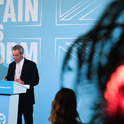Suddenly politicians are bidding to restore benefits to the poor. MPs of all parties now say they want to reverse at least part of the cut to pensioners’ winter fuel payments made last year by Keir Starmer and Rachel Reeves, including Starmer and Reeves themselves. Then this week Nigel Farage joined critics of the government, including Gordon Brown, in calling for an end to the “two-child cap”—the massive welfare cut introduced by the last Conservative government, restricting parents from claiming child tax credits or Universal Credit for more than two children. Even before Farage’s comment, Number 10 started hinting that the cap might indeed be lifted, despite the government’s insistence hitherto that it had to remain in place for reasons of fiscal prudence.
What is going on? These statements only partly motivated by a desire to help the poor.
Reversing the cut to the winter fuel payment, above the level of pension credit, helps better-off pensioners at least as much as those on lower incomes.
Critics of the government who are acutely concerned at the state of child poverty, which has been exacerbated by the two-child cap, hope that Reeves would pay for lifting the cap by an increase in taxes on the better off. In stark contrast, Farage proposes to pay for it by removing benefits from other groups of the poor, notably by withdrawing benefits from voteless asylum seekers. This is a transparent attempt to exploit Labour divisions, particularly in the northern “red wall” seats he hopes to win from Labour at the next election.
Furthermore, in the context of other tax and benefits policies announced by Farage on Tuesday, the end of the two-child cap is a minor change. It is dwarfed by two huge tax cuts he set out—namely, raising the income tax threshold from £12,570 to £20,000, and allowing married couples to transfer this allowance between themselves in order to reduce their tax bill. If applied, these policies would cost the state many tens of billions of pounds. By far the main winners would be married middle class couples, who would be gifted a massive £40,000 allowance before paying any income tax. Only a fraction of the benefit would go to low paid people.
Since Farage proposed nothing like enough spending cuts to pay for these huge income tax policies, this is populism run riot. It is all gain, no pain, like his Brexit policy of a decade ago. Ultimately, the pain will be felt mainly by the poor.
Farage might indeed help force the Labour government to reverse both the two-child cap and the cut to winter fuel payment. But how is this to be afforded, when Reeves has virtually no scope for extra spending or borrowing within her Treasury fiscal rules?
Reeves has also already announced big future cuts in benefits for the unemployed poor, particularly for the disabled. These cuts will likely become as unpopular as the two-child cap when they are introduced, and they may now become larger still in order to meet her fiscal rules.
It is all beginning to look like a tax-and-benefits Ponzi scheme, in which ever bigger welfare cuts are promised so that the government can pay for reversing the last batch of cuts to have become unpopular.
However, Farage is posing another, even bigger challenge to both Labour and the Tories. Until now, both of the old parties have played by conventional rules, policed by the Office for Budget Responsibility (OBR), which require governments and would-be governments to present tax-and-spend policies with figures that add up. Farage has clearly announced that he isn’t going to play by these rules—but what can Starmer and Kemi Badenoch do if the populist’s popularity does not rapidly wane?
Starmer has only limited choices, since the bond markets will repeat their treatment of Liz Truss if he tries to offer massive unfunded tax and spend giveaways.
Badenoch and the Tories, by contrast, are in a death struggle with Farage to be the main opposition party. Until now Badenoch has refused to engage in a Dutch auction with Farage, mindful of the Truss experience. Does she now make a virtue of fiscal responsibility, or take fright and enter the bidding with Reform UK?
Badenoch faces this dilemma even on the two existing welfare controversies, leaving aside Farage’s income tax cuts. She is currently indicating that she could reverse the winter fuel payment cut but not lift the two-child cap. If both Starmer and Farage propose to lift the cap, will she alone stick to this welfare cut on poor children? Fiscal virtue is one thing, but if it comes at the price of electoral oblivion maybe it is not so appealing.
A lot depends on whether Farage can repeat the Donald Trump trick in making populism more genuinely popular than economic responsibility. Either way, the poor have as much to fear as to gain.













